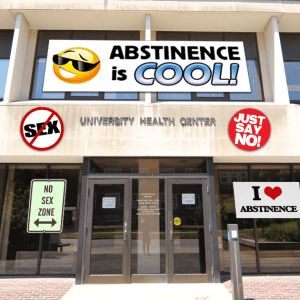
After multiple years of offering STI tests and free condoms to students, the University Health Center has made the decision to offer sexual health services in an abstinence-focused manner that indicates a radical departure from previous approaches.
“After reviewing our sexual health programs, Health Center staff decided we could save a lot of money and reduce staff hours by focusing on abstinence” director David Williams said. “It’s just more cost effective to only have to tell students to keep their hands off each other instead of a complex education process that takes realistic expectations for students into account.”
In the wake of controversy over sex education classes at Omaha Public Schools, parents have voiced strong approval for a UNL program that pretends adult college students are still children.
“My son is a senior and my daughter is a sophomore at UNL, and I just appreciate the Health Center introducing a realistic and age-appropriate sexual health philosophy that gives no details about the actual topic in question,” said Cindy Brown, a local parent. “There is simply no need to fill their young minds with that kind of filth in some misguided quest for health.”
Other members of the community have voiced concern that college students old enough to vote in presidential elections are seen as too innocent to encounter frank discussion of sexual health issues, as are high school students who have legal permission to operate motor vehicles capable of killing others if operated incorrectly.
The University Health Center’s sudden policy change has left large stockpiles of condoms and lubricant that will no longer be distributed to students, sparking discussion about how they could be effectively reused. Unnamed employees of the University Health Center have revealed that plans to use the not-to-be-distributed condoms as balloon animals or food safety gloves show little prospects of success so fa
Though the Health Center’s quarterly budget has yet to be released, early reports indicate that while pregnancy care budget overruns will dwarf savings generated by abstinence-only programs the program can remain solvent for nearly three trimesters.
